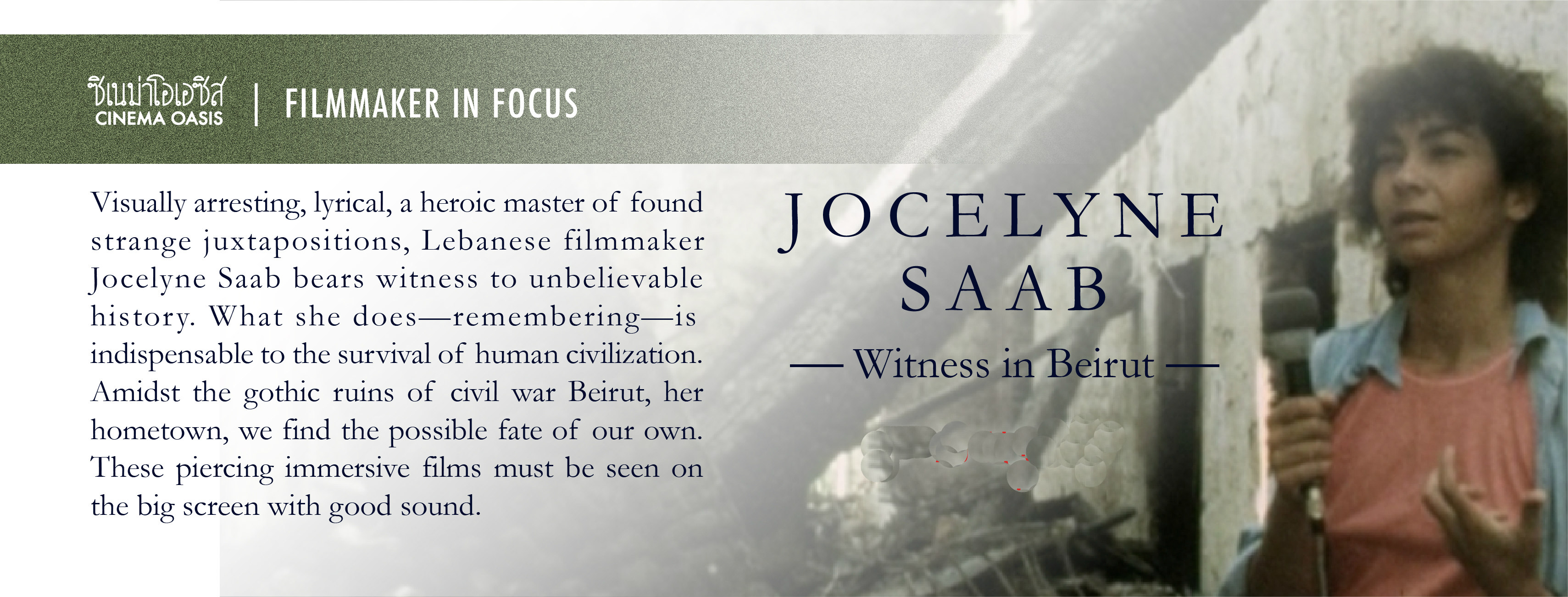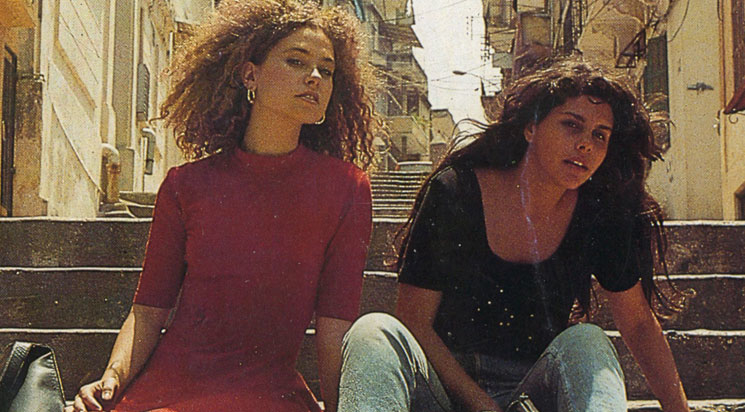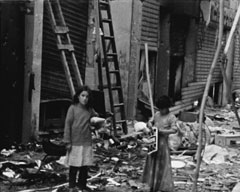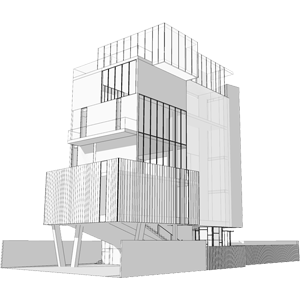Jocelyne Saab : Witness in Beirut

Filmmaker in Focus :
Jocelyne Saab : Witness in Beirut
Visually arresting, lyrical, a heroic master of found strange juxtapositions, Lebanese filmmaker Jocelyne Saab bears witness to unbelievable history. What she does—remembering—is indispensable to the survival of human civilization. Amidst the gothic ruins of civil war Beirut, her hometown, we find the possible fate of our own. These piercing immersive films must be seen on the big screen with good sound.

Once Upon a Time in Beirut
Lebanon/1994/ 100 min/digitized 35 mm/ Color, B&W
In English, Arabic, French with English subtitles
A dusty red Mercedes sedan careens through the haunted devastation of Beirut, almost crashing into a wounded man in a wheelchair; inside 2 girls, a Muslim and a Christian, both born in wartime, who have never known peace & normalcy, joke about their blindfolds & kidnapping: it’s all a lark to them. Diving into the mysterious Mr Faroukh’s cinematic treasure trove, Leila and Yasmine trip through magical old films, foreign and domestic that, pieced together, tell the history of Lebanon. A smug French voice says in an old propaganda black and white film celebrating the arrival of the French Commissioner in the Druze mountains: “We are at home in these far-flung lands, by virtue of a moral right that dates from the Crusades, consecrated by a League of Nations mandate.. The wild warriors on all sides, who have always fought each other, are now reconciled & live under our flag and protection.”
This is followed by a wonderful scene from an early talkie romance, as a Christian girl prepares to run off with a Muslim man. “You should know that your whole life is being decided right now. I’ll give you my whole future, but I will also take your whole existence,” the man tells his intended bride, “You will have to give up your past and your traditions, which are maybe very dear to you.” At her consent, he seals the deal: “Now, Yamile, you are my fiancée, I no longer have the right to look at you until our wedding day,” he says, bringing her veil down over her face, hiding its beauty forever from the world.
As war looms a beautiful woman in a white shirt strolls through a cedar forest, beaming with the joy of it all. “Lebanon, land of beauty, creation of God, paradise on earth,” she sings in an unearthly voice. Into the 60’s as David Niven as Dr Love watches his plane to Beirut blow up minutes after he switched from it. “Beirut is a very small place,” says a scary cop at Beirut airport in another movie, “Sit down by the river bank and wait. Sooner or later you’ll see your enemy’s body go by. Your friends’ too, of course.”
It’s 1967, “the beginning of our Vietnam,” a guitar-strumming young man sings in an old house as the hippie Leila and Yasmine listen, “Israel is in our sky.” A seer divines the girls’ future by scaring some doves into flight with a black flag; they fly in a circle over the wrecked rooftops of Beirut. But even these piercing moments pale when we are confronted with a stark drive through the empty wreckage of a city accursed by colonial aggression and civil war, by greed and hatred. The film is an immersive experience; must see on big screen with good sound.
Director: Jocelyne Saab
Script: Philippe Paringaux, Roland Paringaux, Jocelyne Saab
Photography: Roby Breidi Sound: Pierre Bouvier-Donnadieu, Jean-Pierre Delorme
Editing: Dominique Auvray, Isabelle Dedieu Cast: Michele Tyan, Myrna Maakaron, Emile Accar
Production Companies: Balcon Production, France; Hessicher Rundfunk Arte; Arte Strazbourg; Aleph Production, Beirut
……………………………………………………………..

Letter from Beirut
Lebanon/1978/48 min/digitized 16 mm
In English, Arabic, French with English subtitles
(Shown with ‘Beirut Never More’)
The vision of a beautiful soul: Lebanese filmmaker Jocelyne Saab, petite and very young, sits at a breezy seaside café, writing a letter from Beirut to the world. With lyrical situations and dreamlike images that deepen the unreality of colonial aggression and civil war in one’s own hometown, she takes us among the bullet-pocked and bomb-wrecked ruins, encountering Israeli tanks and international checkpoints by endless unlikely authorities, through the looking glass into a sun-dappled orange orchard, where a young Arafat, more like Che than the fat man we’re used to, holds a picnic for new revolutionaries at their swearing-in ceremony. She has returned to a country and a city that she no longer recognizes.
Jocelyne Saab: “Documentary and fiction co-exist here—their borderline melting away as Lebanon’s daily life is eroded by fictitious reality.”
Director: Jocelyne Saab
Cinematography: Olivier Gueneau
Editing: Philippe Gosselet
Sound Design: Paul Bertault
Songs: Oum Koulthoum, Marcel Khalife
Quoted Text: Etel Adnan
……………………………………………………………………………..

Beirut Never Again
Lebanon/1976/ 34 min/digitized 16 mm/ Color
In English, Arabic, French with English subtitles
(Shown with ‘Letter from Beirut’)
“One traveller out of two in the world had gone to Beirut, but the city doesn’t exist any more,” director Jocelyne Saab tells us as a young man sleeps by the roadside on a sofa, as militants roll by on a jeep and Beirut’s people go about their daily lives. A man walks down the street with his morning cup and his morning smoke, yet clearly vigilant; another passes with his life’s necessities: kerosene lamp, assault rifle and ripe tomatoes obtained somehow from somewhere; all surviving like feral cats amidst the rubble. The British Bank of the Middle East’s smoky façade looms like a genocidal crematorium over gangs of resourceful street urchins, fearless, born into war, who have no memory of normalcy.
Through projected pain & vented rage, non-living objects become charged with awful life. Saab’s dummy sequence is sensational, starting with images of the detritus of mod-cons: cracked TV, broken phone seemingly hurled in anger onto the street, dead typewriter, a melted vinyl record—and then the parade of maimed mannequins begin.
There is strange music in these visions: 3 militia men in swivel bar chairs at the Hotel Normandy, twirling with their rifles as they await the next mayhem. A Holiday Inn pockmarked by RPG rockets. A seafront row of burnt palm trees, “like the columns of the Roman ruins..” A French drawing-room chair, gold-framed with aqua silk brocade, sits patiently on the beach, washed by the rising surf, as children play in the polluted Mediterranean near a putrefying foot. Worse than these casually discarded corpses are the shelves of burned-to-ashes documents in the old rulers’ palace archives.
Meanwhile the pleasures and comforts of life are heightened: trays of freshly baked bread from communal ovens, kids scraping every last drop of gravy off a communal plate. The child soldiers with their hand grenades and playing cards. Possessions are cherished: clasping a carpet, a man runs with a table on his head as gunfire rings out; as a bomb falls nearby a boy pushes along a wheeled serving table. The children haunt us with their beauty and absence of sentimentality, as they fill roles vacated by dead adults: as soldiers, looters, guards, care-takers, garbage collectors. The film ends with the surreal vision of a man sheltering from the sun under a small umbrella with all his possessions on the pavement. This film absolutely needs to be seen on the big screen with good sound.
Director: Jocelyne Saab
Text: Etel Adnan
Jocelyne Saab : Born in Beirut, 1948. Receiving attention with her first feature-length documentary, Lebanon in Turmoil (1975), she also released works about Iran, the Polisario Front of Western Sahara, and Vietnam. While making her Beirut trilogy, she simultaneously worked for Volker Schlöndorff’s Circle of Deceit (1981) as assistant director. Her major works include her first narrative film, Suspended Life (1985); Once Upon a Time in Beirut (1994), dedicated to the anniversary of a century of cinema and the founding of the Lebanese cinematheque; and Dunia (2005). In recent years, her photo installations and her art film What’s Going On (2010) were acclaimed internationally. Saab also founded the organization Cultural Resistance, and in 2013, she became the organizer and curator of the Tripoli Film Festival, Lebanon’s first film festival featuring films of Asia and the Mediterranean area.





